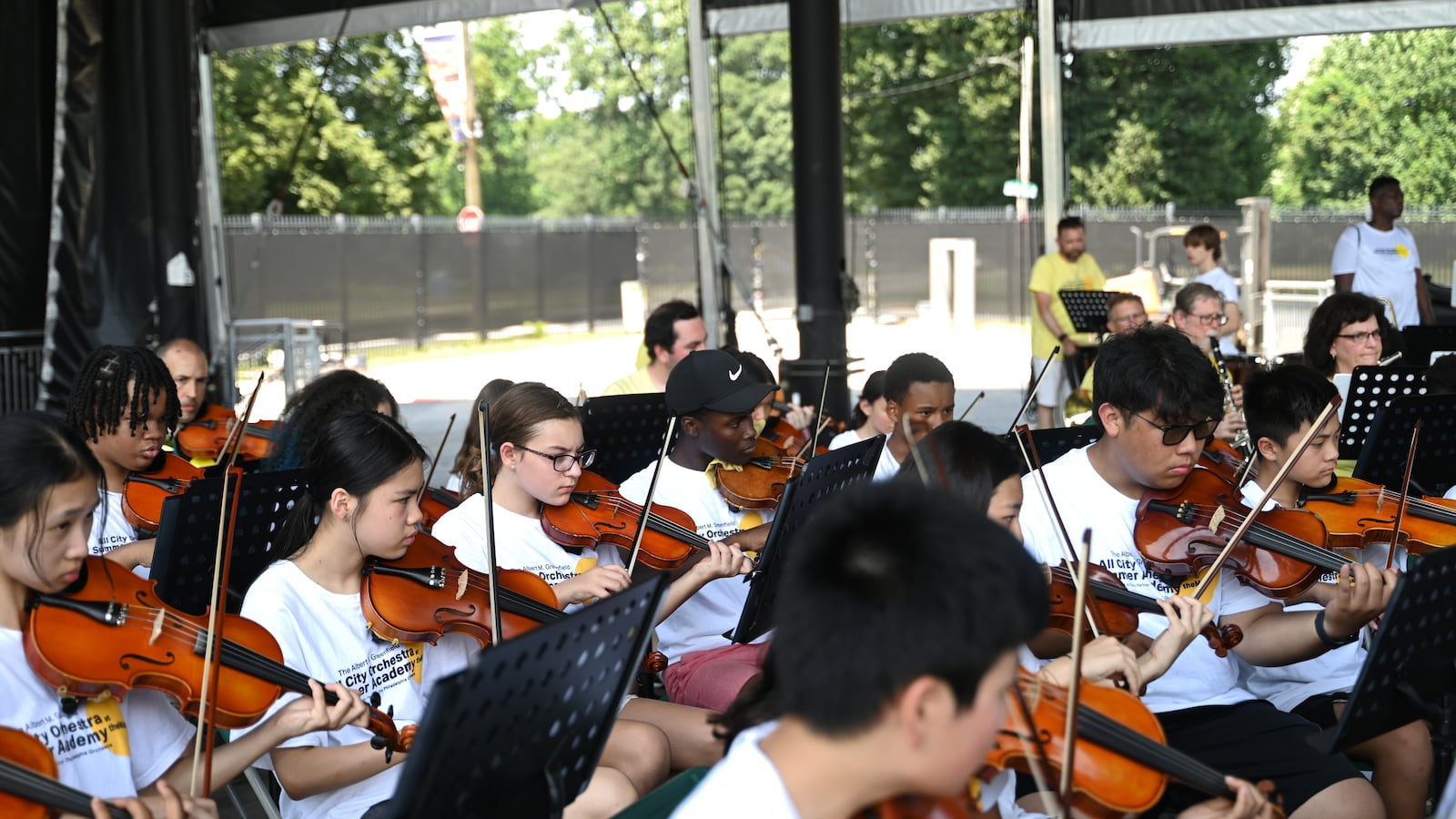Sign up for Chalkbeat’s free weekly newsletter to keep up with how education is changing across the U.S.
Nearly 40 Philadelphia teens toting drums half their size marched onto the Samuel Fels High School stage one day this summer. After performing covers of popular songs, what came next was unusual.
Some 20 musicians in the advanced group in the third annual Summer Drumline Showcase performed a rhythmic composition written not by a veteran professional musician, but by a fellow participant in the program, Christian Borges.
The program’s director and the school’s band director, Brian Morris, had asked Borges to compose a piece for the drumline. Borges — who had never composed his own music before and hadn’t played with a drumline prior to the summer — responded by handing in a first draft of “Redemption” in less than two days. Then he taught it to the other students.
Morris framed the assignment as real-world preparation for Borges, a recent Samuel Fels graduate who will be attending Temple University in the fall on a full scholarship to study music education.
If Borges hadn’t participated in Summer Drumline, a city school district program, he admits that he’d probably be working a typical summer job instead. But the program’s partnership with Career Connected Learning PHL meant some of the students were paid to participate in the program and learn about music as a career option. In short, they could treat drumline like a job.
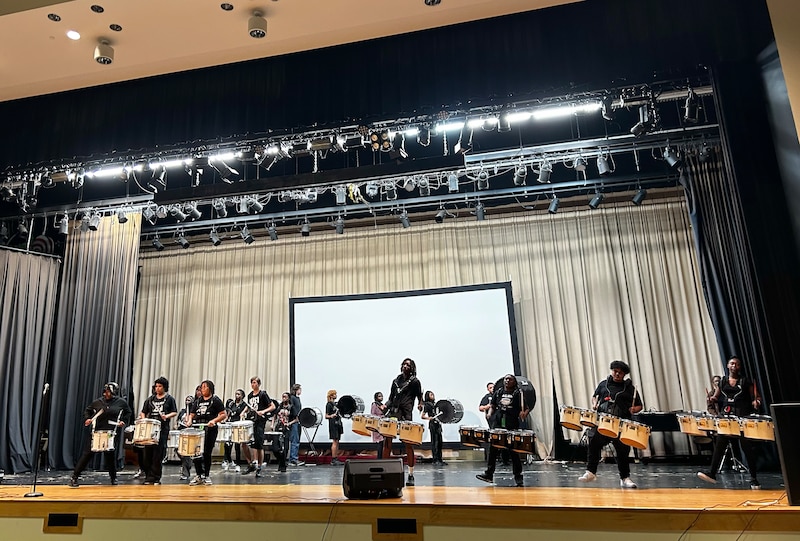
As high schools place more emphasis on preparing students for jobs after graduation, music education programs want to be viewed as part of the solution rather than merely an extracurricular activity. These programs are partnering more frequently with groups that help students explore different careers. These efforts give kids guidance about what it takes to be a violinist, DJ, or backstage producer. The approach could also help schools address a shortage of music educators and diversify the industry. But music education must also deal with new threats to its funding, as well as ongoing doubts about the importance of the arts to students’ career prospects.
The Biden administration issued guidance late last year encouraging schools to use federal money for career education to bolster their music programs. However, the Trump administration’s recent funding cuts threaten to further destabilize music education and limit students’ access to career pathways in music.
Career and workforce development initiatives for music take various forms and can have different goals.
Some programs, like Project STEP in Boston and the Philadelphia Music Alliance for Youth, are dedicated to equipping students from backgrounds historically excluded from classical music with instruments, private lessons, and skills to pursue instrumental music at colleges and conservatories. Project STEP works with roughly 60 students and aims to provide more opportunities to kids who are often underrepresented in music careers. About 60% of students in the program go on to careers in music, STEP says.
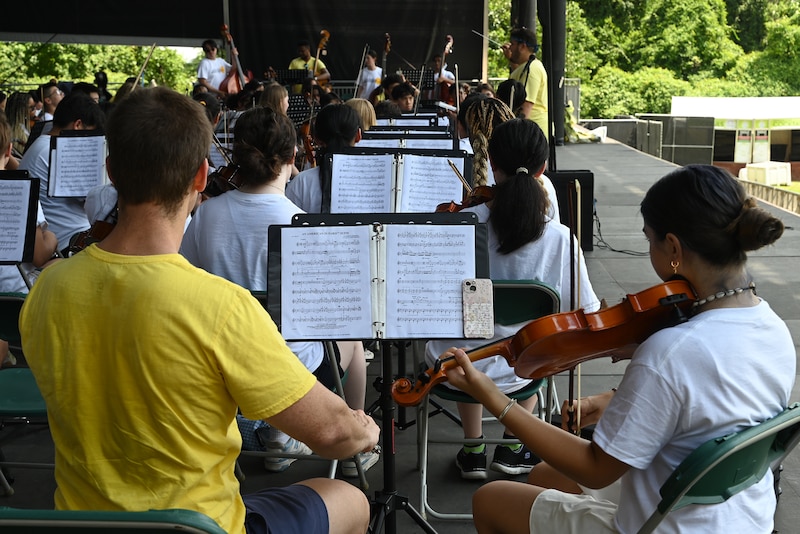
The Mann Center, a Philadelphia concert venue, is home to the All City Orchestra Summer Academy, a camp for young instrumentalists, that provides opportunities for students to work with professional musicians in the Philadelphia Orchestra.
Career preparation through the arts doesn’t necessarily mean career preparation for the arts. The program doesn’t expect most of the students to pursue careers in orchestral music, but connects them with resources to give them that option.
The Mann Center also runs an apprenticeship program that lets students work backstage at concerts and learn about behind-the-scenes aspects of the music industry.
“Not everybody’s going to be Beyonce,” said Catherine Cahill, the Mann Center’s CEO. “But we also know that in the music business, there’s an enormous amount of opportunities backstage. We want to give them a pathway.”
Music education is versatile career preparation, supporters say
In the face of growing competition for funding, those who run music education programs must constantly justify their importance not just to school administrators, but to the private donors who are often crucial.
Jamie Kasper, director of the Arts Education Partnership, said some policymakers are prioritizing subjects like reading, math, and maybe science and social studies, while also implying that “everything else doesn’t belong.”
That’s led arts educators to align themselves with the push to prepare students for college and careers.
At the same time, integrating music education and workforce development should be intentional and help students pursue their passions, said Frank Machos, former head of the Philadelphia school district’s Office of the Arts and Creative Learning. “We don’t want to just chase what’s popular,” said Machos, who now works at the Mann Center.
Joseph Coyners, principal bassist with the Philadelphia Orchestra, plays with students participating in the All City Orchestra Summer Academy. One of his former students, Dan McCain, now teaches in city public schools himself and is also an instructor at the academy. Academy students get chances to interact with professional orchestra members and build connections.
Coyners, who directs the city’s All-City Orchestra, founded Project 440, which provides students with after-school support to apply to college and pursue career pathways related to music. For some students, he notes, “The arts are part of their make-up, DNA. If we can provide a diversity of experiences for them, we can ensure their success.”
Music, he emphasizes, is “a right. When you take away those rights, you take the humanity away from young people.”
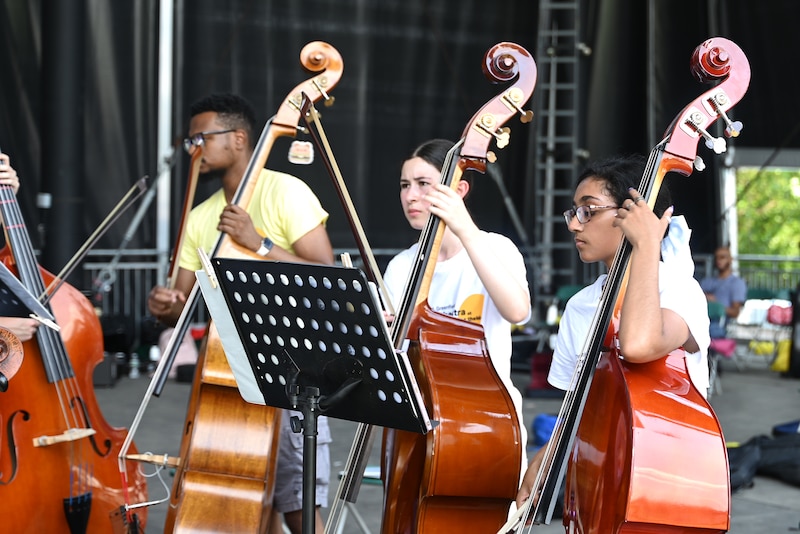
On a recent summer evening, as kids in the orchestra academy poured water over their heads to fend off the heat outside before their rehearsal got underway, one student decided he couldn’t wait.
He grabbed his saxophone, went under a tree, and practiced playing Stevie Wonder’s “Isn’t She Lovely.”
The connections between Coyners, his former student McCain, and McCain’s current students creates a “lineage” of music instruction, McCain said.
It also helps kids see music educators as role models, said Morris, band director at Samuel Fels High School. The Philadelphia school district makes a concerted effort to hire alumni like McCain who teach music education, and it offers instruction in DJing and music production to keep pace with students’ interests.
Funding climate gets tougher for music education
But those efforts have an uphill battle against federal funding cuts that signal broader concern about support for music education. There’s also increased financial pressure on private donations, philanthropy, and local grants that music programs have traditionally utilized to increase the accessibility of their music programs.
Buffalo String Works provides free music education to students — including refugee and immigrant children — in the Buffalo, New York, area. Its programming includes teaching children about sound production and recording.
In general, disparities in access to music training and resources in music education allows some children “to get a jump up from some of their peers,” said Amanda Karhuse, assistant executive director for advocacy and public policy at the National Associate for Music Education.
Still, the goal of Buffalo String Works “is not to create the next wave of accomplished musicians,” said Melinda Smith, the group’s executive director. “We’re really focused on meeting the social and emotional needs of students to make sure that wherever they go and whatever they do they have a core kind of foundation of skills that will support them to thrive.”
In the spring, the Trump administration began canceling grants funded by the National Endowment for the Arts. Buffalo String Works’ $30,000 grant was one of them, and it estimates that its total budget next year will fall to 77% of its previous total. The group has laid off staff, eliminated one school-based program, and reduced another.
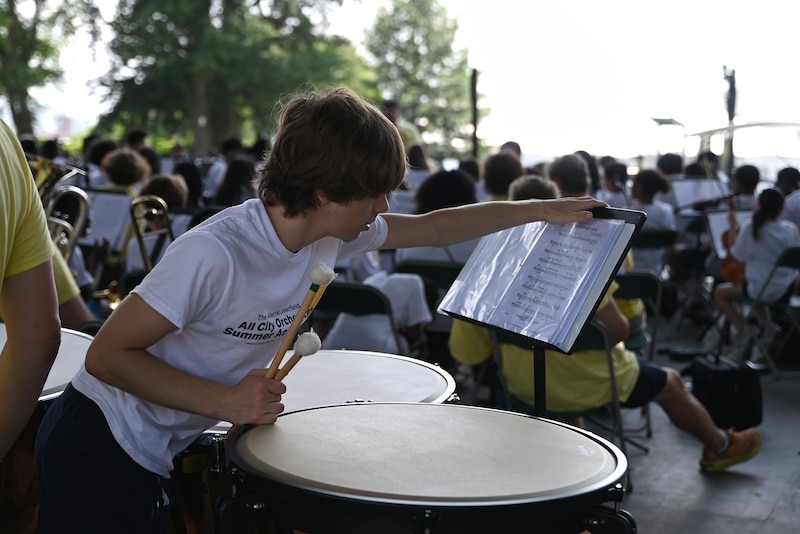
The Mann Center lost a $25,000 NEA grant that supported collaboration between the Philadelphia Orchestra and students in the All-City Orchestra Summer Academy. Boston’s Project STEP lost funding too.
The Trump administration’s 2026 budget proposal does away with dedicated funding for both arts enrichment programming and career education in K-12 schools, raising longer-term concerns. So far, though, lawmakers have preserved this funding in their initial budget bill.
Meanwhile, widespread cuts are putting new demands on philanthropic organizations. Some may conclude that arts education is dispensable. “Competition is very fierce and people are receiving unprecedented requests for support,” Smith said.
Small amounts of money can make a difference to students. Career Connected Learning Philadelphia provides about $1,300 to each student who participates in the Summer Drumline Showcase. Borges, who wrote the original composition, said that initially, “college was not in my plans at all.”
But with Morris’ support, he plans to return to the district after studying at Temple and become a music teacher in Philadelphia public schools.
“At first it was corny,” he said of teaching peers in Summer Drumline his own percussion composition. “I tried not to be too stern on them because they were my friends, but I did have to tell them some things.”
Norah Rami is a Dow Jones business reporting intern on Chalkbeat’s national desk. Reach Norah at nrami@chalkbeat.org.


